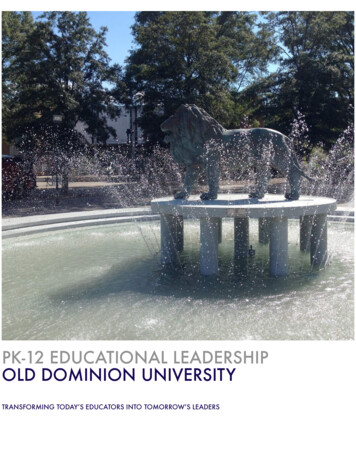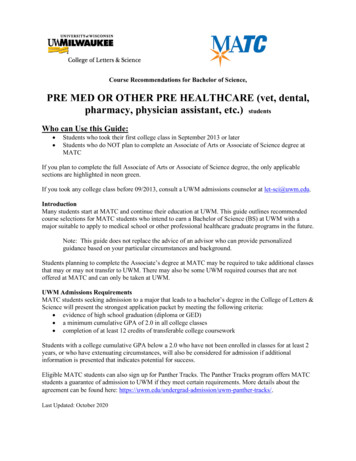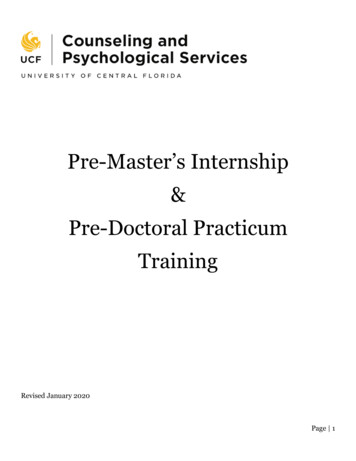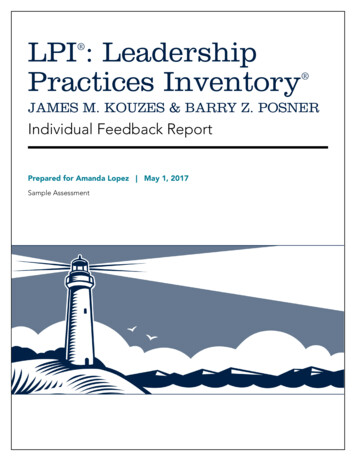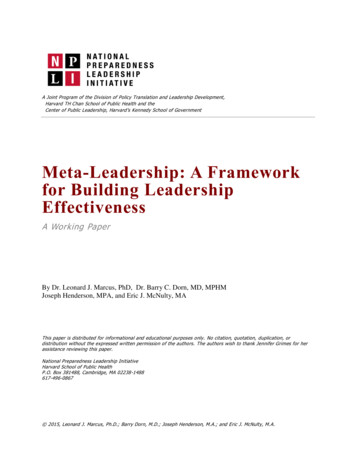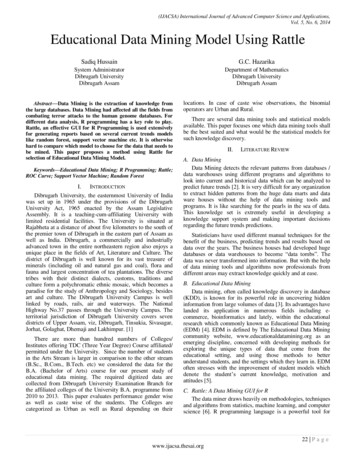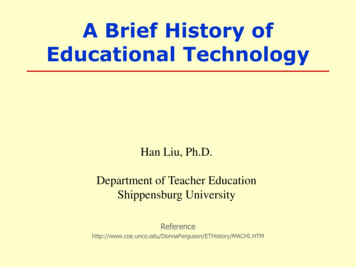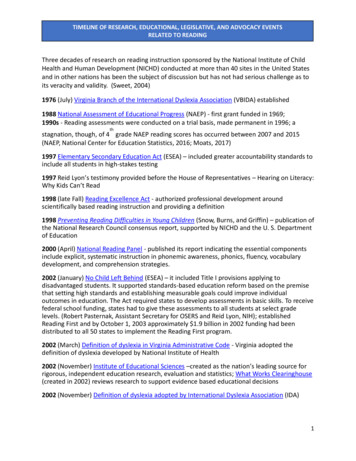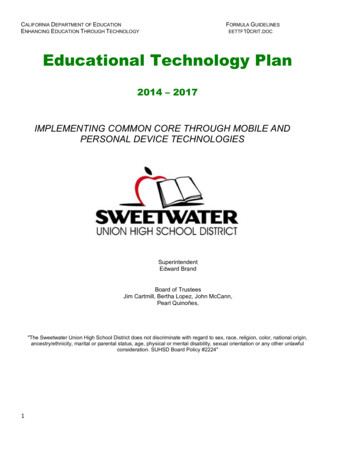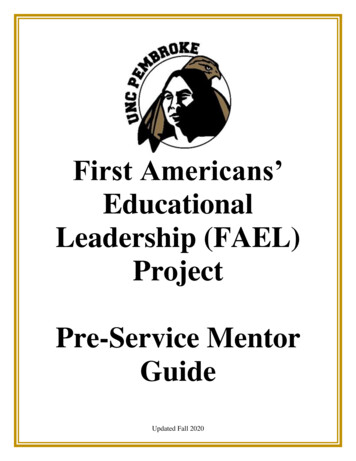
Transcription
First Americans’EducationalLeadership (FAEL)ProjectPre-Service MentorGuideUpdated Fall 2020
2
First Americans’ Educational Leadership (FAEL) ProjectTABLE OF CONTENTSIntroduction .4Cultural Leadership .6Preparation for Administrative Practice .7Preservice and Induction Services .8Project Overview for Pre-service Mentors.10Program Timeframe and Scope .10Mentor Expectations .11Program Commitment.12Potential Areas for Mentoring Support .13Virtual Mentoring .13Associated Measures .13Resources/ Library Collection for Mentors .14Compensation .14Characteristics of an Effective Mentor .15Forms .16Mentee Educational Leadership Personal Development Plan .16Mentor Visitation Logs .17Mentor Final Evaluation .18North Carolina Standards for School Executives .19Competencies .20Mentor Code of Ethics .22Resources .233
INTRODUCTIONUNCP’s MSA Program is designed to prepare individuals seeking exceptionalopportunities for leadership development. The program’s combination of classroom, online, andfield experiences provide flexibility in learning for non-traditional students. The Master ofSchool Administration is designed to prepare administrative leaders for executive leadership in avariety of settings including elementary, secondary schools, and district offices. The conceptualframework of the program is built around five domains to include: Strategic Leadership,Instructional Leadership, Organizational Leadership, Political Leadership, and ManagerialLeadership (The University of North Carolina at Pembroke, 2018). Pre-service training throughProject FAEL will expand on this conceptual framework by providing professional developmentservices in Culturally Responsive Leadership for working with Native American students toensure each student has equitable access to effective teachers, learning opportunities, academicand social support, and other resources necessary for success. Participants will have theopportunity to work hands-on throughout the program that builds on real world experiences. Theopportunity to collaborate with mentors throughout the project will provide aspiring leaders withthe opportunity to develop lasting relationships with exceptional educational leaders as well asextend the classroom theory to the applied experiences as an administrator. Additionally, ProjectFAEL will support participants to expand on their leadership abilities through attendance atprofessional educator’s conferences and membership in a professional association that providesaccess to the latest research and development in educational leadership.The program of study for the program consist of 39 semester hours for the Masters ofSchool Administration and 24 semester hours for the School Administration Add-on that leads toa NC Principal licensure. The Masters of School Administration includes two (2) three-semester-4
hour guided elective courses that are recommended by the advisor, in consultation with thestudent, and approved by the MSA Program Director. The FAEL Program Director and ProgramCoordinator will assist participants with enrollment in elective courses that focus on workingwith students of diversity and poverty along with its impact on education.Course NumberEDN 5660EDNL 5030**EDNL 5710EDNL 5730**ENDL 5800**EDNL 5850**EDNL 5860 **EDNL 5880**Course NameApplied Educational ResearchEngaging our Families, Schools, and CommunitiesAnalyzing Educational IssuesSchool Based ManagementSupervision and Instructional LeadershipCurriculum LeadershipLegal Aspects of Educational LeadershipLeading School Improvement and OrganizationalChangeEDNL 5900/5950**Internship and Seminar in Educational Leadership I & IIAdditional Coursework Guided Electives**Indicates courses needed for Licensure Add-on OnlySemesterHours3 hours3 hours3 hours3 hours3 hours3 hours3 hours3 hours6 hours6 HoursTo create a pool of highly qualified American Indian aspiring administrators, pre-servicetraining during the Internship and Seminar, and mentoring services, as well as the induction plan,will provide rigorous activities that are relevant to working in highly populated American Indianschools. Research suggests the importance of coordinating pre-service programs and trainingwith in-service induction and support (California County Superintendents Educational ServicesAssociation CCSESA, 2016). Therefore, Project FAEL proposes to improve the quality of theinternship and mentoring experience, while in the educational leadership program, to allowaspiring administrators to be exposed to real-world problems before becoming an administrator(Gray, Fry, Bottoms, & O’Neill, 2007) that builds leadership capacity to lead instructionally andtransform schools. The Transformative School Leaders’ Academy provided through ImaginEDwill allow participants to dive deeper into a framework for culturally responsive system design5
on improvement science and the steps necessary to lead innovation and short-cycle continuousimprovement including practice applications of: data capture and reporting, data analysis, SmartGoal setting, action step development, short-cycle testing and adjusting, and managing changeand communicating the plan. This process will allow participants to examine data from their ownschools to identify trends as well as learning gaps and co-create in collaboration with theirmentor an authentic learning experience. For the innovative design component of the training anemphasis will be placed on STEM education and the STEM Community Engagement Process(CVP) developed by the NC STEM Collaborative and the NC Department of Public Instruction,as part of the statewide, “Career & College: Ready, Set, Go” initiative. Participants will beexposed to a variety of model STEM Programs and evidence-based administrative practices.This model will cover the practice steps community engagement, community visioning, programdesign, and business planning and implementation.Cultural LeadershipThe development knowledge of cultural diversity must begin with understanding more ofone’s own culture (Backor & Gordon, 2015). The National Center for Education Statistics(NCES) provides data supporting the underrepresentation of minority teachers and administratorscompared to minority students (Williams & Loeb, 2012). The integration and work of culturallyresponsive leadership finds its foundational roots in the understanding and appreciation ofAmerican Indian culture in all aspects of the school environment. This understanding andappreciation often finds its barriers, or its windows, within administration. Research has shownthat educators’ and administrators’ sense of cultural understanding plays a critical role in theimplementation of culturally relevant pedagogy (Powers, Potthoff, & Bearinger, 2003;Yurkovich, 2001; Yazzie-Mintz, 2007). This sense of cultural understanding, particularly for6
American Indian administrators, begins with a secure foundational belief in their own culture asAmerican Indian leaders. Students of lower-socioeconomic and minority groups are often viewedas not caring about education when the message portrayed to the students is that their culture hasno value (as cited by Glickman, Gordon, & Ross-Gordon, 2018). Therefore, their behavior is acoping strategy for the schooling they receive to accept a dominant culture (as cited byGlickman, et. al, 2018 the American Indian culture through effective school leadership andteacher development will help show value and care to American Indian students. AmericanIndian schools should have curriculum reflecting the specific heritage, community, and tribalsociety. Opportunities must be provided by schools to American Indian students for them to beable to explore other possibilities and have experiences outside of their specific heritage. Dr.Susan Faircloth, a leader in culturally responsive education, will assist the PD and PC withproviding professional development services to participants throughout their pre-service training.Preparation for Administrative PracticeThe proposed FAEL Program will reflect the Master of School Administration (MSA)conceptual framework (CF), vision, and mission. The CF states that the MSA is built around fivedomains that encompass strategic, instructional, organizational, political, and managerialleadership (University of North Carolina at Pembroke, 2018). MSA faculty members haveembraced a vision that requires sound judgments about the design and delivery of the educationprograms in an environment of mutual trust and common commitment to public school childrenand their families. The UNCP's Teacher Education Program (TEP) mission is to develop andnurture competent and caring communities of school professionals who dedicate themselves tothe education and welfare of all students and whose understanding of the dynamicinterrelationship among theory, practice, and reflection compels them to be active agents of7
positive change with sensitivity and integrity, which includes the importance of infusing AIculture into their classroom pedagogy (Guillory & Williams, 2014; Swisher & Tippeconnic,1999). As Morgan (2009) noted: "In order to teach Native Americans in a way that reflects theirculture, teachers must realize that Native American students are often taught differently at homethan are mainstream students, [and] that Native American children can also differ greatly fromeach other.They may have difficulty with the traditional teaching styles of U.S. schools becauseteachers often teach according to mainstream values that do not correspond with the values ofminority students. In order for Native American students to reach their potential in school, it isrecommended that teachers understand those students' preferred ways of learning [whichgenerally tends to be field-dependent, reflective, visual, and cooperative]." (p. 12) observed: "Ifethnic minority groups such as Native Americans are going to have positive experiences inschool, it is important for their culture to be included and portrayed in a fair way." Also, asJacobs and Reyhner (2002) asserted, the goal of education is to produce educators who empowerAI students and "who prepare them to move comfortably among different cultures while valuingthe unique cultural assumptions of their home, community, and heritage" (p. 5). Brown (2006)shares that these schools in demographically changing societies require individuals in leadershiproles who will address issues of social justice and the makeup of each school community. It isimportant for principals to be culturally competent in order to implement the most effectivestrategies and interventions for their school. As such, the FAEL Program AI students also will beexposed to the resources accessible through the University of North Carolina at Chapel Hill’sAmerican Indian Center (AIC) and UNCP's the Southeast American Indian Studies (SAIS)Program. While the MSA CF allows FAEL AI students the opportunity to learn various aspectsof school leadership, the FAEL program will provide critical supplemental cultural leadership8
training that will infuse AI culture into the work of future administrators in order ensure thesuccess of AI students. The experience in the MSA classroom coupled with Project FAEL’spreservice and induction services will prepare participants to adequately face the challenges theywill encounter as an administrator.Pre-Service and Induction ServicesEffective school leadership can have a positive impact on student outcomes. High-qualitymentors can be key to improved training and preparation for novice principals (Gray et al, 2007).To ensure program participants are provided with support and mentoring, induction servicesdesigned to assist administrators on how to improve schools and student performance will beginimmediately upon completion of the school administration program through a partnershipprogram with the university, public school systems, and the Lumbee Tribe. Each participant willbe assigned a mentor from a pool of American Indian Administrators in collaboration with theLumbee Tribe (LTNC) that had proven success as an administrator. Working in collaborationwith local school districts and the Lumbee Tribe, a focus will be on providing support andtraining to novice principals to perform at high levels and increase their ability to address schoolissues and solve problems from day one as an administrator.Research indicates that successful induction programs share similar characteristics(CCSESA, 2016; Shelton, 2012). Aligned to this research and the findings of Darling-Hammond,LaPointe, Meyerson, Orr and Cohen (2007) and Gray et al. (2007) suggestions for effectiveprincipal induction models, Project FAEL proposes an induction plan to include the following:1. Participants will receive continuous knowledge and support from pre-service preparationto in-service training through induction from active and retired administrators with9
proven success in working in low-performing, highly populated American Indian schoolsand experience in mentoring new administrators.2. Opportunities to develop learning networks through a cohort structure with otherprincipals and administrative staff to develop study groups, communities of support, andmentoring that provides ongoing support for successful principal development.3. Effective leadership development and learning that links theory to practice withsupervision and instructional leadership, data analysis that enhances the administrator’sability to improve teacher effectiveness, school climate, and school culture as well asbuilding community relationships.10
PROJECT OVERVIEW FOR PRE-SERVICE MENTORSProgramTimeframe andScopeParticipants thisProgram will ServeThis is a 3-year program that includes the following components: 5-day Transformative Leadership Academy Summer Institute in Year 1and/or 2 with mentor and mentee 7-8 Professional Development Workshops each year for mentors andmentees 2 Training Sessions for mentees per year (Fall and Spring) Development and support of mentors Aspiring American Indian Master of School Administration candidatesenrolled at the University of North Carolina at PembrokeTotal of 20 Participants (assigned 2-3 per pre-service mentor) Provide on-going mentoring support for pre-service administrators,engage in monthly professional development and in the TransformativeSchool Leadership Academy, and provide job placement assistance toensure high-quality school leadership from the very first day as anadministrator. Familiarize participants and their mentors through professionaldevelopment workshops with a framework for designing culturallyresponsive systems of learning and innovation, and STEM education,including research-based improvement science principles.Familiarize aspiring administrators with legal, ethical, and professionalissues and expectations through professional development workshopsand mentor program.Program GoalsProgram Objectives 11
The FAEL mentors will work with participants who are currently enrolledin the Master of School Administration Program to provide support,coaching, and guidance during the participants pre-service training.MentorExpectationsMentor expectations include: Meet in person at least once a month with each assigned mentee (asidefrom monthly PD sessions); make contact with each mentee at least once a week (virtually); attend monthly FAEL Professional Development Sessions and attendthe week-long Summer Transformational Leadership Academy withspecified Cohort; maintain accurate records/logs of mentoring sessions with eachmentee; familiarize pre-service participants with professional growthopportunities through professional development workshops and mentorprograms; be a role model in all aspects of professionalism; complete objective self-assessments to determine mentoring skills andto understand personal strengths; recognize the mentoring characteristics including the strengths andweaknesses of the mentee; incorporate objective assessments and practices completed by thementee to assist with determining mentee skill levels. foster a culture which promotes effective formal and informalmentoring relationships; contribute to on-going assessment and refinement of mentoringprograms through action research; demonstrate professional achievement in the field of Instructional andCultural Leadership; demonstrate a code of ethics including a respect of confidentiality andpromotion of integrity in the mentor-mentee relationship; and follow all guidelines and responsibilities as outlined in the FAELProgram requirements for mentor’s handbook.12
The Mentor agrees to: ProgramCommitment Potential Areas forMentoring Support mentor more than one participant;attend all professional development sessions throughout the Fall 2020and Spring 2021 Semester;attend the Transformative Leadership Academy (with specifiedcohort);meet with my assigned mentee(s) in person at least once per month.make contact with my assigned mentee(s) each week via phone, e-mail,virtual coaching (WebEx, etc.);submit the necessary paperwork each month to the ProjectDirector/Project Coordinator regarding mentoring activities with eachmentee;follow all guidelines and responsibilities as outlined in theFAEL Program requirements for mentors; andcontact the Project Director and/or Project Coordinator should aconflict arise that could prevent me from fulfilling my duties as amentor.Assist mentee with the development of Educational LeadershipPersonal Development Plan.Allow for job shadowing opportunities for mentees.Use data to provide actionable feedback to aspiring principals thatprovokes thinking, creates conditions to promote “healthy” discomfortand opens opportunities for reflection.Share knowledge and expertise that assist mentee with data collection,analysis, and interpretation.Learn and practice having difficult c
UNCP’s MSA Program is designed to prepare individuals seeking exceptional opportunities for leadership development. The program’s combination of classroom, online, and field experiences provide flexibilit

